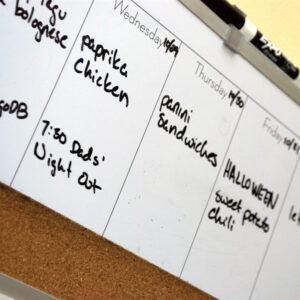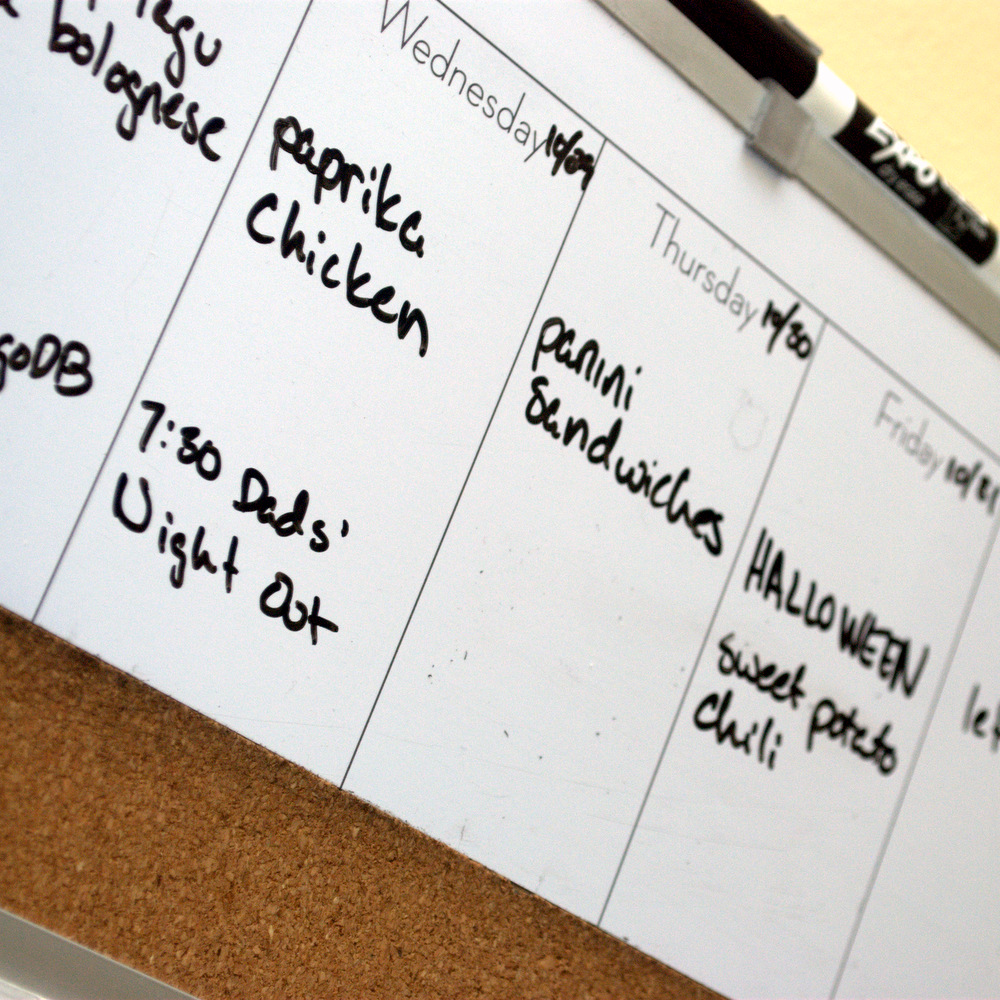 Maybe this has happened to you: you’re getting hungry, it’s almost dinner time, and you wonder what you should eat.
Maybe this has happened to you: you’re getting hungry, it’s almost dinner time, and you wonder what you should eat.
It’s the worst.
Afternoons aren’t my best time. My meds are wearing off, I’ve been on the go all day, and my energy and blood sugar are dropping. Before I started meal planning, we ate a lot of packaged food and takeout.
Until I decided I wouldn’t settle for frustration and a substandard diet at the end of every day.
Now I sit down every Sunday and plan our menu for the week. It can be a chore, but it liberates me from thinking about our dinners at all during the Monday-Friday circus.
If you aren’t meal planning, jump in and give it a try. It minimizes trips to the grocery store, reduces food waste, and — most important — saves our sanity.
Here are a few strategies that have helped us over the years. We’ve never subscribed to a meal planning service like Fresh20, but it may be worth a try if you’re having trouble getting started.
1. Look at your calendar.
What nights will you be rushing in the door late (and hungry)? Do you have a stressful day coming up when you know you won’t feel like cooking? What about after-dinner activities that leave no time for cleanup?
Give yourself some slack on these nights. Plan leftovers, a meal from your freezer stash, or something you can prep the day before.
2. Family dinner isn’t working? Make it breakfast instead.
We’ve all been hearing the “families need to eat dinner together” mantra since childhood. Well, that doesn’t work for our family. We’re on toddler time, which means dinner needs to happen before 5:45, and my husband is a chronic hyperfocuser.
Rather than banking on him getting home for dinner, I made breakfast our family meal. We’re sitting together around the table by 7:15 a.m., seven days a week. At night, R. and I eat at our usual time and I keep a plate warm in the toaster oven for my husband.
Family dinner is a nice goal, but if it’s not working, forcing it may not be the answer. As long as you’re sitting down together for one meal almost every day, you’re doing great.
3. Use free time wherever you have it.
 A friend of mine uses his Sunday afternoons to prep an entire week of family dinners: he precooks pasta, grills chicken, chops veggies, and packages everything up so he just has to heat and serve on weeknights.
A friend of mine uses his Sunday afternoons to prep an entire week of family dinners: he precooks pasta, grills chicken, chops veggies, and packages everything up so he just has to heat and serve on weeknights.
If you’re dragging by the end of the day, are short on time in the evenings, have impatient children, or all of the above, you may want to find a low-pressure time to do your prep work in bulk.
If you have young children, consider cooking during nap time. I learned this technique from Debbie Koenig’s fabulous cookbook Parents Need to Eat Too, which I now buy for every expectant mother I know.
4. Buy a slow cooker
Slow cookers allow you to prepare dinner ahead of time — before work or during nap time — so you have little (if anything) to do in the chaotic moments before dinner. I rely on our slow cooker for at least one meal a week. Large batches of curries, stews, and sauces usually freeze well in containers for easy meals in the future.
Not sure where to start with your slow cooker? Koenig’s book has a nice slow cooker section, and I’m in love with Anupy Singla’s The Indian Slow Cooker. I’m also happy to share my slow cooking Pinterest board.
5. Keep track of what works.
Confession: even if I loved it, I usually won’t remember anything I ate the previous week when I sit down to make my meal plan. Find a way to keep track of successes so you can repeat them: keep a running list of favorite meals in Google Keep, take a photo of your shopping list or meal plan each week, or mark pages of your cookbooks with sticky notes.
Have you tried meal planning before? Were you able to stick with it? Please share your story!
Hey there! Are you enjoying The ADHD Homestead?
Here's the thing: I don't like ads. I don't want to sell your attention to an advertising service run by the world's biggest data mining company. I also value my integrity and my readers' trust above all, which means I accept very few sponsorships/partnerships.
So I'm asking for your support directly. For the cost of one cup of coffee, you can help keep this site unbiased and ad-free.
Below you will find two buttons. The first lets you join our crew of Patreon pals and pledge monthly support for my work. Patrons also have access to my Audioblogs podcast. The second takes you to a simple donation page to pledge one-time or recurring support for The ADHD Homestead, no frills, no strings. Do whichever feels best for you!

